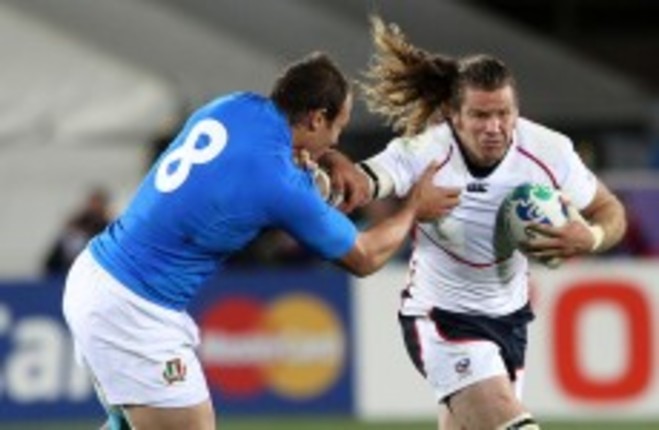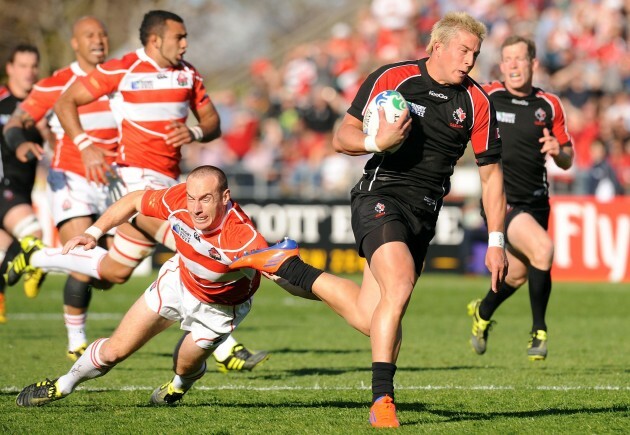LIKE MOST SPORTS publications with an interest in the tournament, we’ve already brought you a Team of the World Cup (So Far), packed with names from the Tri-Nations favourites, Wales and Ireland. But there’s a case to be made for saying that a number of the World Cup’s genuine stand-outs will be watching the knock-out stages from the discomfort of their living rooms.
Our second World Cup selection, then, is comprised of players whose teams have already boarded flights home, whose campaign amounted, in most cases, to little more than a spirited and frustrating refusal to accept the inevitable.
A trio of Scots, Canadians, Italians, Samoans, a Tongan, a Russian, a Namibian, a Japanese and one terrible, terrible haircut: it’s our antidote to quarter-final tunnel-vision.
1. Soane Tonga’uiha (Tonga): The loosehead, who plies his trade in England with Northampton Saints, was a consistently impressive bundle of energy in the midst of a frustratingly inconsistent pack.
2. Shota Horie (Japan): Technically sound and fearless in contact, the Japanese hooker demonstrated an incredible work-rate throughout the tournament, putting himself at the centre of nearly every positive move the Cherry Blossoms put together.
3. Martin Castrogiovanni (Italy): Okay, so he had a stinker against Cian Healy, but front-row scrummaging is an unpredictable and inscrutable business. His all-round strength over the course of the Azurri’s first three group games is more than enough to merit inclusion in our line-up.
4. Richie Gray (Scotland): A lineout threat towering the monstrous side of 2 metres in height, Gray consistently makes the most of his frame.
5. Ian Kellock (Scotland): Gray’s partner and national team captain, Kellock is the other half of Scotland’s set-piece threat. That the side can compete (albeit, sporadically) at all is testament to the effective yin and yang of its second-row duo.
6. Adam Kleeberger (Canada): There’s more to the Canuck’s blindside than his eye-catching beard. Quick, strong and totally committed to the cause, his 24 tackles against Tonga proved crucial in guiding the North Americans to their only win of the tournament.
7. Todd Clever (USA): The heart and soul of the an Eagles side that struggled tournament-long to assert itself with any consistency, Clever’s ill-judged haircut stood in stark opposition to his altogether admirable intensity, even if it prompted the occasional questionable transgression (his last-minute shoulder charge against Russia jumps to mind).
8. Sergio Parisse (Italy): What Todd Clever would call a no-brainer (I’m guessing), this one. Describing Parisse as “world class” has become something of a cliche in recent weeks, but its a label his titanic performances can’t but encourage.
DTH Van Der Merwe evades Japan’s Shaun Webb. (Peter Parks/EMPICS Sport)
9. Taniela Moa (Tonga): The islanders struggled to find their feet in this World Cup, but when they did– surging to victory against France– it was largely as a result of this man’s mastery of his role. Pairing quick distribution with some intimidating running, he dictated the rhythm of the game and reduced the French defence to a state of fatal uncertainty.
10. Theuns Kotze (Namibia): Drafted into the Namibian squad in preparation for the World Cup, the University of Johannesberg starter proved an entirely unexpected revelation at fly-half, injected a hint of elegance and class to a largely pedestrian line-up. His hat-trick of drop goals against Fiji, scored in quick succession, was a sight to behold.
11. Alesana Tuilagi (Samoa): A modern winger in the mould of Jonah Lomu, Tuilagi excels at propelling his 111 kilograms over and/or through defenders at speed. Line-breaks are less a speciality than they are the inevitable outcome of his possession.
12. DTH Van Der Merwe (Canada): The Maple Leafs’ other star of the tournament was a South African-born centre with an enthusiasm for taking the ball into contact and a knack for materialising on the shoulder of runners, regardless of their position on the field.
13. Eliota Fuimaono-Sapolu (Samao): His performances on the field may not have been anything to rant and rave about, but boy, did he make the an impact. His tweet branding Nigel Owens a “racist prick” will not be forgotten soon; neither, I hope, will his more cogent arguments about the IRB’s institutional failings.
14. Denis Simplikevich (Russia): Tipped for stardom after excelling for Russia’s Sevens outfit, Simplikevich marked his graduation to rugby’s big-time with a try in each of his World Cup matches, the pick of which was a stormer of an interception against the Wallabies.
15. Chris Paterson (Scotland): Arguably the most gifted international goal-kicker of his generation, the full-back’s Test swansong wasn’t quite the redemptive one he had been hoping for. He succeeded, nonetheless, in marking himself out as the lone live-wire of a dour and predictable Scottish attacking line.


